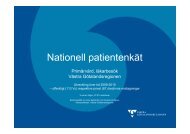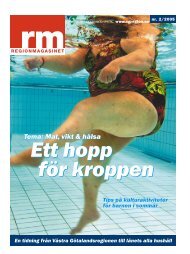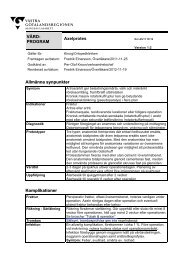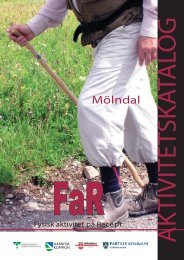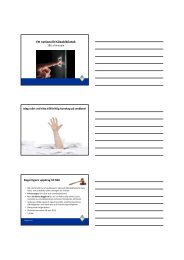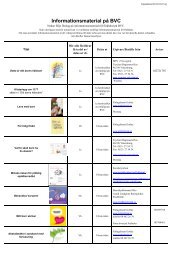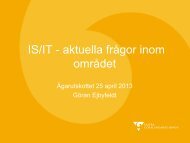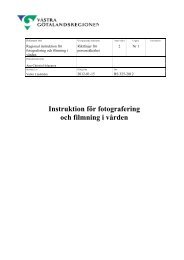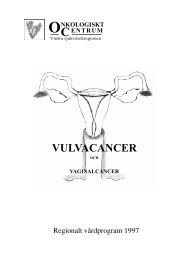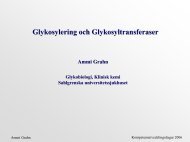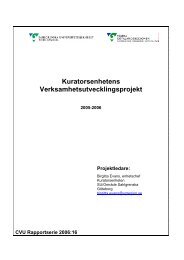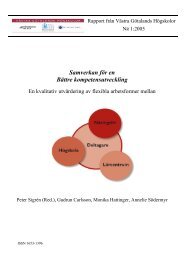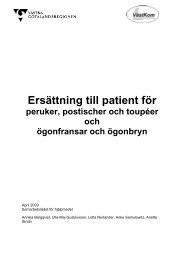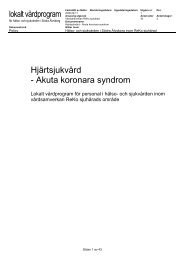Lag om stöd och service till vissa funktionshindrade (LSS)
Lag om stöd och service till vissa funktionshindrade (LSS)
Lag om stöd och service till vissa funktionshindrade (LSS)
Create successful ePaper yourself
Turn your PDF publications into a flip-book with our unique Google optimized e-Paper software.
Act concerning Support and Service for<br />
Persons with Certain Functional Impairments<br />
(<strong>LSS</strong>)<br />
What is <strong>LSS</strong>?<br />
The Swedish Act concerning Support and Service for Persons with Certain<br />
Functional Impairments [<strong>Lag</strong>en <strong>om</strong> <strong>stöd</strong> <strong>och</strong> <strong>service</strong> <strong>till</strong> <strong>vissa</strong> <strong>funktionshindrade</strong>]<br />
(<strong>LSS</strong>) is an entitlement law that guarantees good living conditions for people with<br />
extensive and permanent functional impairment, ensuring that they receive the help<br />
they need in daily life and that they can influence the support and <strong>service</strong>s they<br />
receive.<br />
A request for support and <strong>service</strong> fr<strong>om</strong> an individual who meets the criteria for this<br />
Act shall first be evaluated to ascertain whether it is a measure that is regulated by<br />
this Act, because it can generally be assumed that such requests benefit the<br />
individual. Measures pursuant to this Act are only provided when the individual<br />
requests them.<br />
Who is entitled to measures pursuant to <strong>LSS</strong>?<br />
To be entitled to measures pursuant to this Act, individuals must meet the criteria<br />
specified by the Act. They must need assistance in activities of daily living and their<br />
needs may not be met in any other way.<br />
This Act applies to people who<br />
1. are mentally retarded or autistic, or who have a condition resembling autism<br />
2. have considerable and permanent mental impairment following brain damage<br />
sustained as an adult, as a result of external force or physical illness<br />
3. have s<strong>om</strong>e other lasting physical or mental impairment that is clearly not due to<br />
normal aging, if such impairments are substantial and cause considerable difficulties<br />
in daily life and consequently, an extensive need for support and <strong>service</strong>.<br />
Those who are qualify for measures pursuant to this Act<br />
are entitled to the following:<br />
1. Advice and other personal support [Rådgivning <strong>och</strong> annat personligt <strong>stöd</strong>]<br />
Individuals who qualify for measures pursuant to this Act may be entitled to support<br />
fr<strong>om</strong> experts who, in addition to their professional knowledge, also have special<br />
knowledge about what it is like to live with serious functional impairments. A social<br />
worker, psychologist, physical therapist, preschool adviser, speech therapist,<br />
occupational therapist, or dietitian can provide such support. Advice and support<br />
shall be a c<strong>om</strong>plement to and not a replacement for measures such as rehabilitation<br />
and social <strong>service</strong>s.<br />
2. Personal assistance [Personlig assistans]<br />
Individuals with serious physical impairments who have not reached the age of 65<br />
may be entitled to assistance fr<strong>om</strong> one or more personal assistants.<br />
1
To be entitled to personal assistance, the individual must need help with meals,<br />
personal hygiene, dressing and undressing, c<strong>om</strong>municating with others, or need<br />
s<strong>om</strong>e other assistance that requires extensive knowledge of people with functional<br />
impairments.<br />
The municipality may provide assistance directly or the individual may obtain financial<br />
aid, in which case the individual acts as an employer and hires s<strong>om</strong>eone to provide<br />
assistance.<br />
The municipality has full econ<strong>om</strong>ic responsibility for anyone who needs assistance<br />
for fewer than twenty hours per week. If the requirement for personal assistance for<br />
basic needs exceeds twenty hours per week, the individual is entitled to an<br />
assistance benefit pursuant to a separate law, known as the Act concerning<br />
C<strong>om</strong>pensation for Assistance [<strong>Lag</strong>en <strong>om</strong> assistansersättning] (LASS).<br />
The local insurance office determines whether the applicant qualifies for the<br />
assistance benefit. The municipality is financially responsible for the first twenty hours<br />
following approval.<br />
People with substantial functional impairment who are older than 65 must either have<br />
or have had personal assistance before the age of 65, or applied for personal<br />
assistance before the age of 65. However, such personal assistance may not be<br />
increased after the individual reaches the age of 65.<br />
3. C<strong>om</strong>panion Service [Ledsagar<strong>service</strong>]<br />
Individuals who do not have personal assistance may be entitled to c<strong>om</strong>panion<br />
<strong>service</strong>. C<strong>om</strong>panion <strong>service</strong> shall be personalized, tailored to meet the needs of the<br />
individual to have an active social life.<br />
4. Contact Person [Kontaktperson]<br />
In order to reduce social isolation, assist in participation in leisure activities, and<br />
provide advice in daily situations, individuals may s<strong>om</strong>etimes need help fr<strong>om</strong> a<br />
contact person, who can make it easier for the individual to live independently.<br />
S<strong>om</strong>etimes a family, known as a support family, can provide support.<br />
5. Relief <strong>service</strong> in the h<strong>om</strong>e [Avlösar<strong>service</strong> i hemmet]<br />
Relief <strong>service</strong> is available both as a regular <strong>service</strong> and for unexpected situations.<br />
6. Short stay away fr<strong>om</strong> h<strong>om</strong>e [Korttidsvistelse utanför det egna hemmet]<br />
The purpose of a short stay away fr<strong>om</strong> h<strong>om</strong>e is to provide the individual with the<br />
opportunity for recreation and a change of environment while providing relief for<br />
relatives. A short stay can be arranged in a short-term h<strong>om</strong>e, with another family, or<br />
in s<strong>om</strong>e other way, such as at a camp.<br />
7. Short period of supervision for schoolchildren over the age of 12<br />
[Korttids<strong>till</strong>syn för skolungd<strong>om</strong> över 12 år]<br />
Schoolchildren over the age of 12 are entitled to supervision before and after school<br />
and during holidays.<br />
2
8. Living arrangements in a family h<strong>om</strong>e or in a residence with special <strong>service</strong>s<br />
for children and adolescents<br />
[Boende i familjehem eller i bostad med särskild <strong>service</strong> för barn <strong>och</strong> ungd<strong>om</strong>]<br />
Children and young people who cannot live with their parents may be entitled to live<br />
with another family or in a residence that provides special <strong>service</strong>s. This should be a<br />
c<strong>om</strong>plement to the parental h<strong>om</strong>e both for the children who can live with their parents<br />
part of the time and for those who cannot live at h<strong>om</strong>e at all.<br />
9. Residence with special <strong>service</strong>s for adults or other specially adapted<br />
housing<br />
[Boende med särskild <strong>service</strong> för vuxna eller annan särskilt anpassad bostad]<br />
Residential arrangements may vary, but the most c<strong>om</strong>mon forms are group housing<br />
[gruppbostad] and <strong>service</strong> housing [<strong>service</strong>bostad]. The individual may also be<br />
entitled to a specially adapted h<strong>om</strong>e that is assigned by the municipality.<br />
10. Daily activities [Daglig verksamhet]<br />
Working age individuals who are not gainfully employed or studying are entitled to<br />
assistance participating in daily activities if they qualify for <strong>LSS</strong> pursuant to criteria 1<br />
and 2.<br />
Cost<br />
In principle, these special initiatives are free for the individual, with a few exceptions.<br />
Individual plan [Individuell plan]<br />
Anyone who has been granted an approved measure pursuant to this Act may<br />
request an individual plan that presents the approved and planned measures. This<br />
plan shall be formulated in consultation with the individual who is to receive support.<br />
People with functional impairments who qualify for measures according to this Act<br />
may request to have an individual plan formulated and to participate in the<br />
formulation of this plan.<br />
The individual shall have the opportunity to influence what will be included in the<br />
plan, who will be involved, and the opportunity to express any needs and requests.<br />
The plan shall also show how objectives will be achieved. The plan should include<br />
help coordinating all contacts.<br />
The plan may include:<br />
Brief description of the entire family situation, the future (e.g. when school starts),<br />
etc.<br />
Current measures.<br />
Measures that are needed/will be needed.<br />
Measures that the family would like.<br />
What various involved parties (including the family) will do and when.<br />
What are the needs of the family? (Don't forget siblings!)<br />
How do we want to get help?<br />
Just because information is included in the plan does not mean it has been<br />
approved.<br />
3
The plan shall be followed up, usually on an annual basis.<br />
Application<br />
Each municipality has a separate <strong>LSS</strong> administrator or an assistance administrator<br />
who is responsible for <strong>LSS</strong>. Applications may be submitted in writing, though they<br />
may also be made orally during a meeting with the administrator. The person with<br />
the functional impairment is the applicant.<br />
More information<br />
The Swedish Act (1993:387) concerning Support and Service for Persons with<br />
Certain Functional Impairments (<strong>LSS</strong>)<br />
[<strong>Lag</strong> (1993:387) <strong>om</strong> <strong>stöd</strong> <strong>och</strong> <strong>service</strong> <strong>till</strong> <strong>vissa</strong> <strong>funktionshindrade</strong>]<br />
Government bill (1992/93:159) concerning Support and Service for Persons with<br />
Certain Functional Impairments<br />
[Proposition (1992/93:159) <strong>om</strong> <strong>stöd</strong> <strong>och</strong> <strong>service</strong> <strong>till</strong> <strong>vissa</strong> <strong>funktionshindrade</strong>]<br />
4



